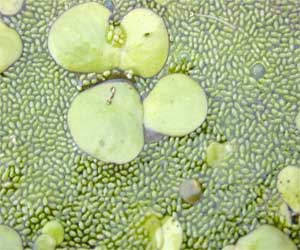- Home
- Editorial
- News
- Practice Guidelines
- Anesthesiology Guidelines
- Cancer Guidelines
- Cardiac Sciences Guidelines
- Critical Care Guidelines
- Dentistry Guidelines
- Dermatology Guidelines
- Diabetes and Endo Guidelines
- Diagnostics Guidelines
- ENT Guidelines
- Featured Practice Guidelines
- Gastroenterology Guidelines
- Geriatrics Guidelines
- Medicine Guidelines
- Nephrology Guidelines
- Neurosciences Guidelines
- Obs and Gynae Guidelines
- Ophthalmology Guidelines
- Orthopaedics Guidelines
- Paediatrics Guidelines
- Psychiatry Guidelines
- Pulmonology Guidelines
- Radiology Guidelines
- Surgery Guidelines
- Urology Guidelines
This green aquatic plant may lower blood sugar in Prediabetes

DELHI: A novel green aquatic plant Wolffia globosa Mankai could be a promising potential plant-based protein source to control blood sugar in prediabetics -- is the bottom line of a recent study.
The study, published in the journal Diabetes Care found that the patients who were given a green shake containing Wolffia globosa duckweed in dinner had better control of blood sugar postprandially compared with people given an iso-carbohydrate/protein/calorie yogurt shake.
In this randomized crossover trial, Hila Zelicha, Faculty of Health Sciences, Ben-Gurion University of the Negev, Beer-Sheva, Israel, and colleagues examined the effects of W globosa Mankai on postprandial and fasting blood sugar in a group of 20 abdominally obese individuals with impaired fasting blood sugar.
In the study, the 20 abdominally obese participants (age 51.4 years; fasting plasma glucose 110.9 mg/dL) were allocated to replace dinner with either a green shake containing Wolffia globosa duckweed (Mankai: specific-strain) or an iso-carbohydrate/protein/calorie yogurt shake. postmeal glucose dynamics (6 net administration days; 97 observation days in total) was assessed using a 2-week flash glucose-monitoring system. Data on dietary/daily activity/satiety-scale/sleep logs was collected from each patient. Participants were recruited from the green-Mediterranean diet arm of the 18-month Dietary Intervention Randomized Controlled Trial-Polyphenols Unprocessed (DIRECT-PLUS) study.
Also Read: Poor blood sugar control tied to low muscle mass in type 2 diabetes patients
Key Findings:
- Wolffia globosa Mankai elicited a lower postprandial blood sugar peak compared with yogurt (∆peak = 13.4 ± 9.2 vs. 19.3 ± 15.1 mg/dL), which occurred later (77.5 ± 29.2 vs. 59.2 ± 28.4 min) and returned faster to baseline glucose levels (135.8 ± 53.1 vs. 197.5 ± 70.2 min).
- The mean post-net incremental area under the curve (netAUC) was lower with Wolffia globosa up to 60 and 180 min (netAUC 60 min 185.1 ± 340.1 vs. 441.4 ± 336.5 mg/dL/min; netAUC180 min: 707.9 ± 1,428.5 vs.1,576.6 ± 1,810.1 mg/dL/min).
- A Wolffia globosa-based shake replacing dinner resulted in lower next-morning fasting glucose levels (83.2 ± 0.8 vs. 86.6 ± 13 mg/dL).
- Postprandial glucose levels from the shake administration until the next morning were lower in the Wolffia globosa Mankai green shake compared with the yogurt shake.
- Overnight sleep duration was similar (378.2 ± 22.4 vs. 375.9 ± 28.4 min), and satiety rank was slightly higher for the Wolffia globosa shake compared with the yogurt shake (7.5 vs. 6.5).
Also Read: Elevated Blood sugar and High BP increase risk of Heart block: JAMA
"Wolffia globosa Mankai duckweed may serve as an emerging alternative plant protein source with potential beneficial postprandial glycemic effects in obese individuals with impaired fasting glucose," concluded the authors.
For detailed study log on to https://doi.org/10.2337/dc18-2319

Disclaimer: This site is primarily intended for healthcare professionals. Any content/information on this website does not replace the advice of medical and/or health professionals and should not be construed as medical/diagnostic advice/endorsement or prescription. Use of this site is subject to our terms of use, privacy policy, advertisement policy. © 2020 Minerva Medical Treatment Pvt Ltd